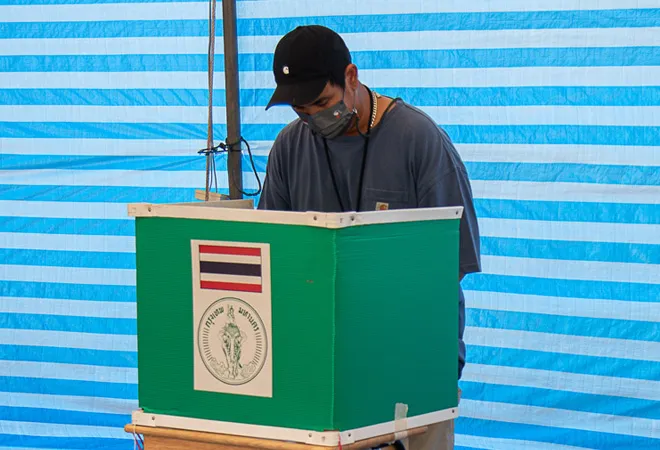-
CENTRES
Progammes & Centres
Location
While a new reformative government is set to take power in Thailand, the complexities of international relations and domestic aspirations will shape Thailand's political trajectory in the coming years

Thailand's national election in 2023 marked a significant moment in the country's political landscape as voters exercised their democratic rights to shape the future of their nation. The current mood in Bangkok is electric with celebrations unfolding in every corner. After close to a decade, both the old and young have voted for the youth-led party. namely the Move Forward Party (MFP), which has secured the most seats and the largest share of the popular vote.
Close behind is the populist Pheu Thai Party, securing just over 23 percent of the constituency seats. As the votes were nearly fully counted on 15 May, preliminary results posted on the election commission website indicated that the MFP was poised to secure the largest portion of seats in the lower house, with a total of 147 seats. Out of the 147 seats, 112 are directly elected seats and an additional 35 seats are from the proportional allocation of 100 seats to parties. Pheu Thai Party has secured a total of 138 seats in the Parliament, from which 112 seats were directly elected through constituencies, and an additional 27 seats were obtained through the party list proportional representation system. This substantial seat count reinforces the Pheu Thai Party's position as a significant player in the political arena.
The Bhumjaithai Party came third, playing a significant role in advocating for the legalisation of cannabis in Thailand. As a member of the existing ruling coalition, Bhumjaithai is likely to garner approximately 70 seats in the Parliament. The United Thai Nation Party, led by Prime Minister Prayut Chan-o-cha, who came to power through a military coup in 2014, found itself in fifth place with 36 seats. Prayuth's former party, Palang Pracharath, secured the fourth position with approximately 40 seats.
Many voters expressed dissatisfaction with the Prayut Chan-o-cha administration and demanded greater accountability, transparency, and respect for democratic principles.
The election has been meticulously watched both domestically and internationally, given Thailand's complex political dynamics and the desire for a more inclusive and representative government.
Drivers for change
One of the key factors that shaped the election was the strong desire for political reform. Many voters expressed dissatisfaction with the Prayut Chan-o-cha administration and demanded greater accountability, transparency, and respect for democratic principles. They sought change in areas such as making constitutional amendments, tackling corruption, addressing socio-economic disparities, and ensuring the protection of human rights.
The progressive Move Forward Party (MFP) emerged as a prominent force in the election. Led by a younger generation of politicians, the MFP advocates for bold reforms, including redefining the monarchy, reducing military influence, rewriting the Constitution, and ending conscription. The party's focus on these issues resonates strongly with many younger voters who are eagerly awaiting change and a more progressive vision for the country.
According to Mr Pita Limjaroenrat, leader of MFP, a coalition is on the cards. This alliance will bring together five former Opposition parties and a newly formed party, resulting in a total of 309 Members of Parliament. With the intention of assuming the position of Prime Minister, Pita is poised to establish a new government. To foster transparency and uphold the commitments made during their election campaigns, the parties involved intend to create a Memorandum of Understanding (MoU). This agreement will serve as a framework for ensuring accountability and openness, not only among themselves but also to the broader population.
Navigating uncertainties ahead
Thailand's Parliament and Constitution play crucial roles in defining the political terrain and setting the course of governance in Thailand. The current Constitution, which was adopted in 2017, introduced a number of significant changes to the structure and composition of the Thai Parliament. Under this Constitution, Thailand operates under a bicameral system consisting of the House of Representatives and the Senate.
The House of Representatives is composed of 500 seats, with members elected through a mixed-member proportional representation system. Out of these seats, 350 are allocated through constituency-based voting, while the remaining 150 seats are distributed based on party-list proportional representation. The House of Representatives holds significant legislative power and is responsible for the passage of laws and the scrutiny of government policies.
To foster transparency and uphold the commitments made during their election campaigns, the parties involved intend to create a Memorandum of Understanding (MoU).
However, the role of the Senate in the Thai Parliament is notable, as it serves as a check on the power of the House of Representatives. The Senate is composed of 250 members who are not directly elected by the public. Instead, they are appointed by various institutions and organisations, including the military, judiciary, and professional bodies. This composition has been a subject of debate and criticism, as it has been seen as an avenue for the military to exert influence over the political process.
The military's role in the Thai Parliament is particularly evident in the appointment of senators. The 2017 Constitution, which was drafted during a period of military rule, grants the military significant influence over the appointment process. The junta-appointed National Council for Peace and Order (NCPO), which governed Thailand between 2014 and 2019, handpicked a portion of the senators. This has raised concerns about the fairness and impartiality of the appointment process, with critics arguing that it undermines the democratic principles of representative governance.
While the NCPO was officially disbanded after the inauguration of the new cabinet on July 2019, its discretionary powers were handed over to the Internal Security Operations Command, which is currently chaired by the Prime Minister.
Efforts to amend the Constitution and reduce the military's influence have been met with resistance from conservative forces, including those aligned with the military-backed establishment. Despite these challenges, the Opposition parties and pro-democracy activists continue to advocate for constitutional reforms for a more inclusive and representative political system. Whether the new coalition formation will be able to achieve this change will be crucial to watch.
Positive approach
When questioned about concerns regarding the potential rejection of a coalition formed by the Senate, which requires 376 votes for the endorsement of the Prime Minister, Mr Limjaroenrat expressed confidence and dismissed any worries. He stated that the party is not concerned about the Senate opposing their mandate, as they believe they have received a clear mandate from the people. According to Pita, the party's confidence stems from the belief that the Senate will align with the people's will and support their coalition formation.
Efforts to amend the Constitution and reduce the military's influence have been met with resistance from conservative forces, including those aligned with the military-backed establishment.
Similarly, on the matter of amending the most controversial Section 112 of the Thai Criminal Code, known as lèse-majesté, which includes the provision that individuals who defame, insult, or threaten the monarchy can face imprisonment ranging from 3–15 years without any proper trial or notice, Pita stated that discussions on amending this rule are on the cards.
From a foreign policy angle, the inclusion of well-educated and respected leaders like Pita and Srettha in a new government could bring about notable changes for Thailand. These changes may facilitate enhanced bilateral cooperation on crucial issues such as human rights, and climate change, and may help in combatting transnational criminal networks within Thailand. Pheu Thai and MFP have all expressed commitments to invest in Thailand's 5G infrastructure, drive digital and technological adoption in the government sector, and support small and medium enterprises in leveraging the benefits of the digital economy. While Thailand has collaborated with China’s Huawei Technology in this regard, the election results and the potential change in leadership provide a fresh opportunity for the United States and India to collaborate with Thailand in these critical areas and contribute to shaping regional digital frameworks and standards.
However, it is important to note that while the promises and intentions of the newly-elected leaders have set the stage for a potential foreign policy shift, the actual implementation and outcomes are yet to be seen. The complexities of international relations, diplomatic considerations, and the balancing of various interests will shape Thailand's foreign policy trajectory in the coming years.
Sreeparna Banerjee is a Junior Fellow at the Strategic Studies Programme, Observer Research Foundation.
The views expressed above belong to the author(s). ORF research and analyses now available on Telegram! Click here to access our curated content — blogs, longforms and interviews.

Sreeparna Banerjee is an Associate Fellow in the Strategic Studies Programme. Her work focuses on the geopolitical and strategic affairs concerning two Southeast Asian countries, namely ...
Read More +